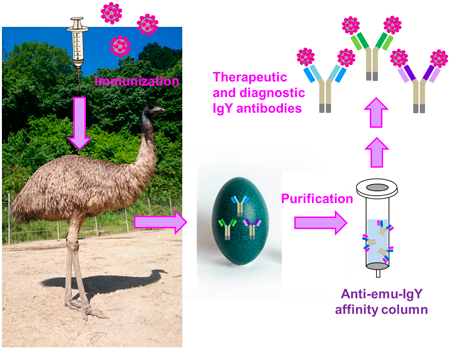- 著者
- Kouya Yamaki Kiyoe Ohta Norihiro Kobayashi Izumi Morita Yuki Kiguchi Hiroyuki Oyama Ken Ito Asuka Nanbo Hirozo Oh-oka Yutaka Koyama Yoshiki Kawata Hirotaka Fujisawa Mitsuhiro Ohta
- 出版者
- The Pharmaceutical Society of Japan
- 雑誌
- Biological and Pharmaceutical Bulletin (ISSN:09186158)
- 巻号頁・発行日
- vol.45, no.8, pp.1022-1026, 2022-08-01 (Released:2022-08-01)
- 参考文献数
- 20
The emu is the second largest ratite; thus, their sera and egg yolks, obtained after immunization, could provide therapeutic and diagnostically important immunoglobulins with improved production efficiency. Reliable purification tools are required to establish a pipeline for supplying practical emu-derived antibodies, the majority of which belongs to the immunoglobulin Y (IgY) class. Therefore, we generated a monoclonal secondary antibody specific to emu IgY. Initially, we immunized an emu with bovine serum albumin multiply haptenized with 2,4-dinitrophenyl (DNP) groups. Polyclonal emu anti-DNP antibodies were partially purified using conventional precipitation method and used as antigen for immunizing a BALB/c mouse. Splenocytes were fused with myeloma cells and a hybridoma clone secreting a desirable secondary antibody (mAb#2-16) was established. The secondary antibody bound specifically to emu-derived IgY, distinguishing IgYs from chicken, duck, ostrich, quail, and turkey, as well as human IgGs. Affinity columns immobilizing the mAb#2-16 antibodies enabled purification of emu IgY fractions from sera and egg yolks via simple protocols, with which we succeeded in producing IgYs specific to the severe acute respiratory syndrome coronavirus type 2 (SARS-CoV-2) spike protein with a practical binding ability. We expect that the presented purification method, and the secondary antibody produced in this study, will facilitate the utilization of emus as a novel source of therapeutic and diagnostic antibodies.
